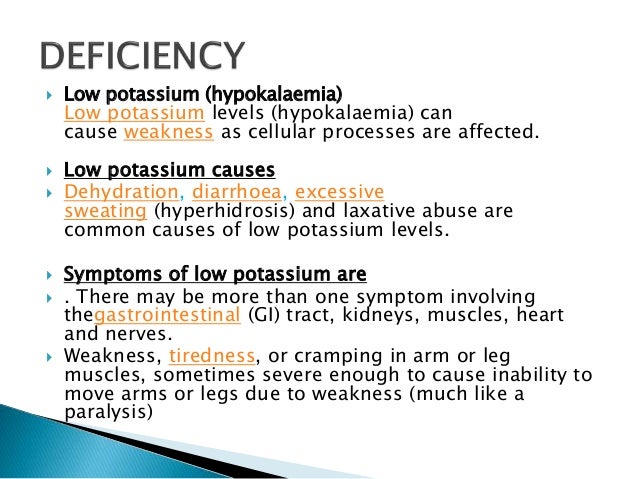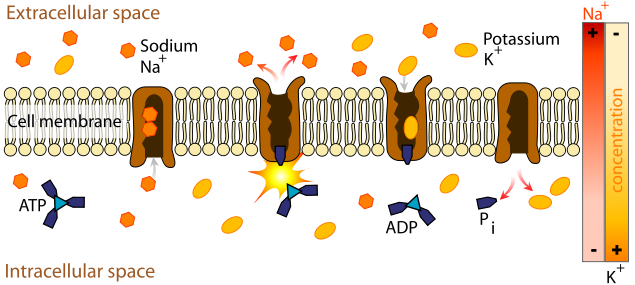One cup of cooked squash contains about 15 of your daily potassium value with 640 milligrams. A typical electrolyte panel measures sodium potassium chloride and bicarbonate.
Any condition that affects the amount of fluid in the bodyincluding dehydrationcan cause an electrolyte imbalance.

Potassium levels in dehydration. Can dehydration affect a kidney values test. In type 2 and sometimes in type 1 bone pain and osteomalacia may occur in adults and rickets may. Home remedies for reducing potassium Reduce your potassium intake.
According to the Merck Manuals Online Medical Library as the potassium decreases a person may experience muscle cramps and weakness nausea and vomiting. One of the easiest ways to lower your potassium levels naturally is to reduce the amount. Inform himher the target range for serum potassium levels.
The reason is that although the common causes of dehydration such as profuse sweating vomiting and diarrhea result in a loss of electrolytes especially sodium and potassium even more water is lost so the concentration of sodium in the blood rises. Medications laxatives diuretics magnesium deficiency excessive etho. As the body loses fluids it can affect the concentration of its electrolytes which are important substances present inside the cells and the bloodstream that affect various metabolic process including fluid and water balance.
Teach the patient on how to follow a low potassium diet. Hypokalemia low potassium levels can happen if potassium is forced inside the cells intracellular and the potassium levels in the blood extracellular drop below 30 mmolL. When potassium levels in the blood are low as occurs in types 1 and 2 neurologic problems may develop including muscle weakness diminished reflexes and even paralysis.
Abnormalities in renal function and electrolytes correlated significantly with severity of dehydration. Dehydration kidney failure diabetes and internal bleeding can all lead to high potassium levels. The outcome of patients correlated with severity of dehydration with mortality occurring in 181 of patients with Severe dehydration.
Educate the patient about hyperkalemia. Hyperkalemia also spelled hyperkalaemia is an elevated level of potassium K in the blood serum1 Normal potassium levels are between 35 and 50 mmolL 35 and 50 mEqL with levels above 55 mmolL defined as hyperkalemia34 Typically this results in no symptoms1 Occasionally when severe it results in palpitations muscle pain muscle weakness or numbness12 An abnormal heart rate. Rhabdomyolysis a breakdown of muscle.
Hypokalemia also occurs if the body is losing potassium through the loss of bodily fluids. The normal serum potassium level is between 35 to 52 mmoLL. There are several causes of hyperkalemia but the three main causes are.
Hyperkalemia occurs when the potassium levels in your blood are too high. Dehydration and low potassium hypokalemia can be caused by multiple things. The mineral imbalance interferes with the normal function of brain cells and when.
Additionally ACE inhibitors and certain chemotherapy drugs have been causally linked to an excess of potassium in the blood. Dehydration occurs when the body does not have enough fluids to carry out its baseline functions. Nearly everyone gets about half of their daily water requirement from solid foods and fruit and vegetable juices.
Renal function and electrolyte abnormalities were seen more in Acute Watery Diarrhea with increasing levels of blood urea serum creatinine and abnormal levels of serum sodium seen with increased severity of dehydration. Dehydration occurs when you do not intake enough fluids like water. Some salt substitutes are also high in potassium.
In type 1 kidney stones may develop causing damage to kidney cells and in some cases chronic kidney disease. Brain dehydration is a serious conditionby the time the brain is feeling the effects of dehydration the rest of your body is suffering. This leads to an improper water volume in the body resulting in an imbalance of the minerals in the bloodstream cells.
Taking in too much potassium potassium shifts due. Early warning signs include persistent fatigue muscle weakness or cramps headaches dizziness nausea confusion. A decrease in potassium levels may not cause any significant initial symptoms.
Dehydration normally causes the sodium level in the blood to increase. One of the electrolytes affected by dehydration is potassium. Two of the most common tests for evaluating kidney function and diagnosing kidney disease are the blood urea nitrogen BUN test and.
But as you discovered seniors often have a reduced appetite and sense of thirst. Check your salt substitutes. This can lead to dehydration one of the most common causes of hospitalization after age 65.
With 422 milligrams of potassium bananas should be. Because of potassiums importance to the muscles hypokalemia may cause tetany or painful muscle spasms. Defined as potassium serum blood levels below 35 mEqL hypokalemia is a common electrolyte imbalance and GI loss is the most common cause.
To give the patient enough information on hypernatremia and its effects to the body. When you buy a salt substitute make sure. Having high levels of potassium hyperkalemia can often be worse than having a deficiency.






